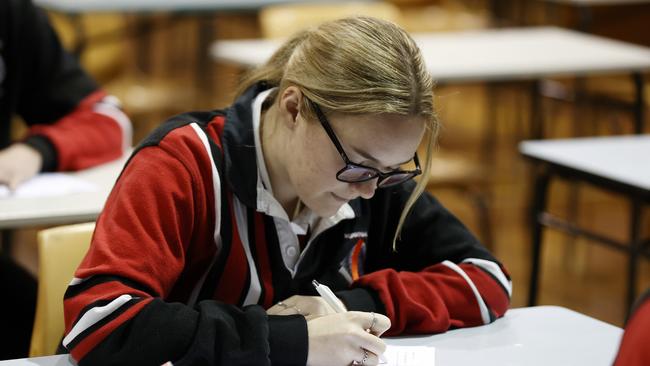SACE 2023 exams: Expert tips on General Mathematics, Mathematical Methods
Thousands of Year 12 students are cramming for their written SACE exams. An expert tutor and the managing director of Tutors SA, the leading tutoring institute in Adelaide gives his tips on how to achieve the best results in General Mathematics and Mathematical Methods.

Education
Don't miss out on the headlines from Education. Followed categories will be added to My News.
General Mathematics and Mathematical Methods are two of the more popular SACE mathematics subjects in recent years, with a total of 7118 Year 12 students sitting them last year.
EXPERT GUIDE: ESSENTIAL MATHEMATICS
EXPERT GUIDE: ENGLISH LITERACY STUDIES
GENERAL MATHEMATICS
General Mathematics is the most popular SACE maths subject in recent years.
Generally, the exam consists of nine questions from three key topics – statistical models, financial models and discrete models.
In this examination students will be able to bring in one A4 double sided sheet of handwritten notes.
Common areas that students can focus on to avoid mistakes include:
PRACTICE writing more concise but complete answers with less unnecessary repetition of the question. This will also help with optimising students’ time management during the exam.
MAKE sure to round off calculated answers accurately. Based on the 2022 General Mathematics subject assessment advice developed by the SACE Board, some example areas where this is more applicable are related to questions on interest rates, correlation coefficients and parameters when fitting mathematical models.
STUDENTS must relate their responses to the context of questions. Such responses are called for throughout the exam. Students need to be aware that they must explicitly show this relationship to the context in their answers, not just give ‘standard’ or generic statements, if they are to gain full marks.
PRESENT answers and descriptions clearly. While examination markers aim to award marks for sufficient evidence of student understanding, students are advised to leave any relevant working out and not cross it out.
As a final word of advice, consider your specific exam timetable and develop and/or revise your study plan for final revision.
Focus more on the areas to improve on, while providing sufficient focus on areas that you are already good at.
Fine tune your cheat sheet and make sure to use it during your revision for more familiarity.

MATHEMATICAL METHODS
The Mathematical Methods exam consists of two booklets with a total of 100 marks, which account for 30 per cent of the final grade.
In recent years, it is evident from past papers that there has been an equal emphasis on both calculus and statistics.
Even though statistics is taught in terms two and three in most schools following calculus in terms one and two, students need to put equal focus – if not more – into statistics as well.
In the Mathematical Methods examination students will be allowed to bring in two A4 double sided sheets of handwritten notes. They must not be typed.
It is best to prepare the cheat sheet now and start using it when students are doing their revision so they are familiar with the notes they have captured.
When it comes to actual performance on the day of the exam, students can learn from common mistakes made by past students and develop strategies to overcome them.
They have included:
STUDENTS not providing enough evidence or explanations to demonstrate their understanding. They can refer to model answers to gain a good understanding of the expected level of required evidence and be mindful not to write explanations which are too brief.
STUDENTS not putting enough attention in comprehending worded problems, and the flow of the structured questions. As a result, in some cases students end up answering a question different to what has been asked. One of the straightforward ways to overcome this is to read the question upfront and make quick notes of important points mentioned. Students can practice this while going through past exam papers.
NOT continuing with all the subparts of structured questions. Even if a student does not successfully solve one part of a question, there is a high chance that they can score from the other sections.
As a final word of advice plan how you are going to approach the exam, especially at the start, to gain some early confidence by selecting questions that you are most confident of completing.
Dr Don Wenura Dissanayake is the founding owner and the managing director of Tutors SA, a leading Adelaide-based provider of private tuition, and managing director two other institutes MedPrep and STEM Centre Australia, serving for students from Reception – Year 12. Equipped with a PhD in Electronics Engineering from the University of Adelaide, he is a former research scientist, senior research fellow, lecturer and specialist tutor with more than 20 years’ experience.


